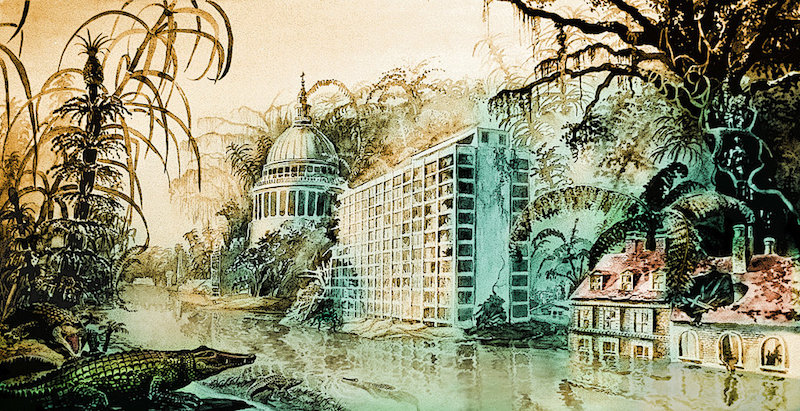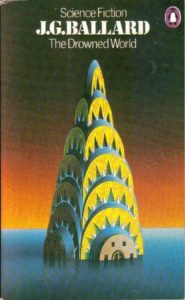

The brief span of an individual life is misleading. Each one of us is as old as the entire biological kingdom, and our bloodstreams are tributaries of the great sea of its total memory
*
“In J.G. Ballard’s new book we have something without precedent in this country, a novel by a science-fiction author that can be judged by the highest standards. To my knowledge this level has yet been attained by only two American writers, Algis Budrys and Walter M. Miller. Mr. Ballard may well turn out to be the most imaginative of H.G. Wells’ successors, although he has expressly repudiated Wells as an influence.

“The setting is among the super-tropical swamps, lagoons and jungles that, as a result of the increase in the sun’s heat, now cover most of Earth’s surface. Plant and animal life is reverting to the giant bamboos and reptiles of the Triassic Age. Among the members of a survey team, sent south from Greenland to determine whether parts of Europe may someday be reclaimable, a parallel but far more complex and disturbing regression can be glimpsed.

“Those so affected share a recurrent dream in which they appear to be reversing the process of their birth, losing their identity in a warm sea that is at once the uterine fluid and the primeval ocean from which life emerged. In their waking hours they withdraw more and more irrevocably into the consciousness of their remote biological past, and the book ends with the hero’s departure on a lone trek southward toward some kind of paradisal graveyard of the species.

“There is plenty of drama, notably after the arrival of a diabolical free-booter, bone-white in a world of darkened skins, whose ship is crammed with salvaged alter-pieces and equestrian statues and whose entourage consists of a band of half-civilized negroes and a pack of quarter-tamed alligators. By his agency the main lagoon is drained and a Walpurgisnacht enacted among the slime-coated buildings of what proves to be Leicester Square. But the main action is in the deeper reaches of the mind, the main merit the extraordinary imaginative power with which whatever inhabits these reaches is externalized in concrete form. The book blazes with images, striking in themselves and yet continuously meaningful.

“There are perhaps faults of luxuriance, not very reprehensible anyway in a young writer. The similes, though often marvelously appropriate, sometimes crowd too thickly, and the author sees fit here and there to tell us that such-and-such is strange while amply demonstrating its strangeness. But he triumphantly achieves his object, set out in a fascinating article of his in a recent New Worlds Science Fiction, of exploring ‘inner space.’ His emblem is the metaphorical diving-suit, as against the literal space-suit of most of his contemporaries.”
-Kingsley Amis, The Observer, January 27, 1963

